The
Neutra House: Adaptive Reuse and Relocation of One of “Three
Small Houses in an Orchard”
by Tom Horan, AIA
DMJM H&N
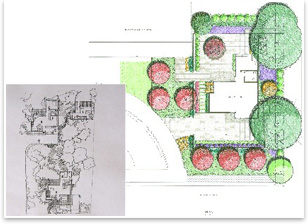 Summary: A
team effort saves two of Richard Neutra’s “Three Small
Houses in an Orchard” in Los Altos, Calif. Summary: A
team effort saves two of Richard Neutra’s “Three Small
Houses in an Orchard” in Los Altos, Calif.
In 1935, Richard Neutra began designing, on
one plot of land, what he called “Three Small Houses in an
Orchard” in Los Altos, Calif., with the two main residences
for two Bay Area poets, Jacqueline Johnson and Clayton Stafford.
The project was completed in 1939. Stafford and his wife occupied
one house, Johnson occupied an identical 750-square-foot house, and
the third, smaller house was intended for guests. The houses represented
a distinctive phase in the evolution of Neutra’s ever-experimental
approach to the residence, both for their size, their co-location,
and their use of redwood siding. The plot of land was located about
a third of a mile from the Los Altos Civic Center.
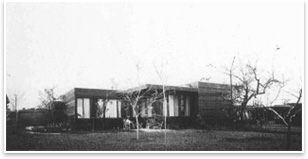 In 2005, the Johnson House and guest house remained, but development
pressures threatened them. The City Historical Commission proposed
that the Johnson House was relatively unchanged and should be moved
to city land and saved. Former Commissioner Mark Sandoval, AIA, was
a key player in generating this proposal. The City Council concurred
that it could be done if it did not require city funds. In 2005, the Johnson House and guest house remained, but development
pressures threatened them. The City Historical Commission proposed
that the Johnson House was relatively unchanged and should be moved
to city land and saved. Former Commissioner Mark Sandoval, AIA, was
a key player in generating this proposal. The City Council concurred
that it could be done if it did not require city funds.
At this point, the Los Altos Community Foundation got involved.
A piece of city land near the civic center and next to the Los Altos
Community Foundation building was allocated by the city for this
project on the condition that the Los Altos Community Foundation
would raise the funds necessary to move the house and adapt it for
reuse. Citizens who saw the value and potential of the Neutra House
committed the initial funding for the urgent task of moving the house
before an impending demolition. This meant an overall site plan had
to be developed for the city parcel and a foundation designed and
poured. The house arrived in two pieces in November 2005 and was
set on its new foundation in January 2006.
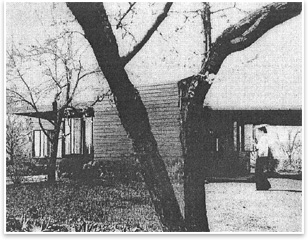 A new foundation for Modern architecture A new foundation for Modern architecture
With the immediate danger over, the Community Foundation established
a designated fund, called “The Neutra House Project,” to
establish a vision for the self-sustaining community use of the
Johnson House. They now are using that vision to develop plans
and raise funds for its implementation. When it is completed, the
house will be a self-supporting community conference resource and
retreat center with advanced audio/video and digital capabilities.
It will also be the locus of a developing and rotating series of
high definition video exhibits on Modern architectural history,
with a particular focus on the residential work of Neutra and Bay
Area architects of the mid-20th century.
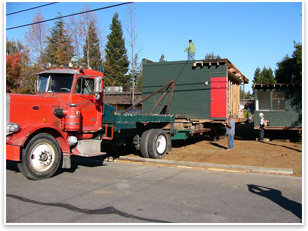 A former Los Altos mayor with the hard-to-turn-down name of King
Lear volunteered to raise funds to do this project and is now also
the project director. With help from Sandoval, volunteers from the
Los Altos Community Foundation, Executive Director Roy Lave, and
site manager Dave Knudson, the task began. Through Lear’s persuasions,
several design professionals with longstanding interest in the community,
including architects and landscape architects, have donated their
services. In addition, Lear established an Architecture History Committee
consisting of a half-dozen local architects and landscape architects
to guide the development of the content of the exhibits to be presented
in the facility. A former Los Altos mayor with the hard-to-turn-down name of King
Lear volunteered to raise funds to do this project and is now also
the project director. With help from Sandoval, volunteers from the
Los Altos Community Foundation, Executive Director Roy Lave, and
site manager Dave Knudson, the task began. Through Lear’s persuasions,
several design professionals with longstanding interest in the community,
including architects and landscape architects, have donated their
services. In addition, Lear established an Architecture History Committee
consisting of a half-dozen local architects and landscape architects
to guide the development of the content of the exhibits to be presented
in the facility.
Neutra draws crowds, funds
The adapted and relocated house is nearing completion, and the fundraising
efforts are trying mightily to stay ahead of construction. The
commitment to restore the exterior as much as possible to its original
condition has not come without cost: custom steel casement windows
(adapted for double glazing) and rehabilitated redwood siding are
two important but not inexpensive features of the project.
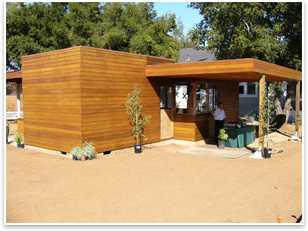 As a shot-in-the-arm for these efforts, a fundraising reception
at the house in mid-September featured a panel discussion led by
some of the members of the Architecture History Committee and other
noted local design professionals. The discussion was lively, and
the interest of the general public in Modern architecture was evident.
The connection was clearly drawn and clearly appreciated between
current concerns about resources, energy use, and the sustainability
of our way of life, on the one hand, and the simple, efficient, thoughtful
Modern design of this pioneer of Modernism, Richard Neutra, on the
other. As a shot-in-the-arm for these efforts, a fundraising reception
at the house in mid-September featured a panel discussion led by
some of the members of the Architecture History Committee and other
noted local design professionals. The discussion was lively, and
the interest of the general public in Modern architecture was evident.
The connection was clearly drawn and clearly appreciated between
current concerns about resources, energy use, and the sustainability
of our way of life, on the one hand, and the simple, efficient, thoughtful
Modern design of this pioneer of Modernism, Richard Neutra, on the
other.
|


 Summary:
Summary:


